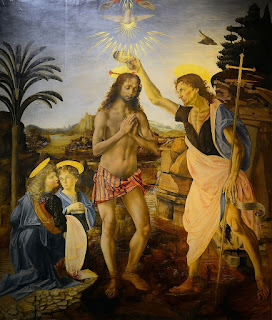1st Trinity III
Mark 8:27 - Mark 9:1
And Jesus went on with his disciples into the region of Caesarea Philippi (in the north of the land at the source of the Jordan where the Roman Caesar was worshiped as a divine being). And on the way there, he asked the disciples (and said to them), "Who do people say that I am?"
They said to him, "Some say that you are John the Baptist; others say, Elijah, still others that you are one of the prophets."
Then he asked them, "And
you, who do you say that I am?'
Then Peter answered, "You are the Christ."
And Jesus warned them not to tell anyone about him.
And he began to teach them, "The
Son of Man must suffer much and will be rejected by the leaders of the people,
by the elders and the teachers of the law, and he will be killed, and after
three days he will rise again." Freely and openly, he told them this.
 |
| Tissot, Get Thee Behind Me, Satan |
And he called the crowd together, including his disciples, and said to them, "Whoever would follow me must practice self-denial and take up their cross and follow me. For whoever is concerned about the salvation of their own soul will lose it, but whoever gives their life for my sake and the sake of the gospel, their soul will find power and healing. For what use is it to a human being to gain the whole world if through that they damage their soul, which falls victim to the power of an empty darkness? What then can they give as ransom for their soul? In this present humanity, which denies the spirit and lives in error, whoever is ashamed of me and my words, of them the Son of Man will also be ashamed when he comes in the shining revelation of the Father among his holy angels."
And he said to them, "The truth I say to you, among those who are standing here, there are some who will not taste death before they behold the kingdom of God arising in human beings, revealing itself in the power and magnificence of the spirit."
1st Trinity III
July 24, 2022
Mark 8:27-9:1
 |
| Collot d'Herbois |
Christ asks Peter: Who do you say that I am? And in that
very instant, a recognition is born. Peter answers: You are the Christ!
Why would Jesus be so insistent that his disciples not tell
anyone about him? Because something had been newborn into humanity. And it needed
protection.
What was newborn was first of all Christ himself—so recently
sent down by God, baptized. He needed protection from the destructive powers of
the world. Not forever—for as he goes on to say, he will suffer and die at the
hands of the people. But not yet.
The second and almost equally important newborn thing in
humanity is the human recognition of him, here on earth, within another human
being. Peter’s recognition, that Jesus is the Christ, the long-awaited Son of
God become Son of Man, is another tender newborn, the faculty to recognize the
divine. This, too, needs protection from the all too earthly adversarial forces.
Such forces exist within Peter, within all of us, as thoughts about avoiding
suffering. ‘Now the adversary is speaking through you. Your thinking is not
divine but merely human in nature,’ Christ says in response.
It is human nature to protect—newborns, friends, the newly
discovered God within. But ultimately, the path of the divine is one of
suffering and death, and then of resurrection into yet another newborn level of
existence. The divine is to be nurtured and protected for a little while. Yet
its ultimate aim is not self-protection, but self-offering, self-sacrifice.
When time is ripe, the disciples will be told to go out and preach the good
news everywhere. But to do so now would prematurely arouse the destructive
forces against the newborn.
In the Act of Consecration, we have once again the
possibility of an intimate encounter with Christ. We could hear him asking us,
‘Who do you say that I am?’ Once again, we have the opportunity to recognize
him. We will protect and nurture this recognition of the I AM within our
hearts. And when time is ripe, we, too, will spread the good news.


.jpg)











